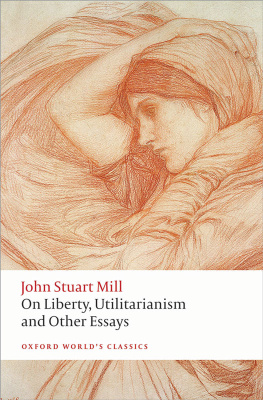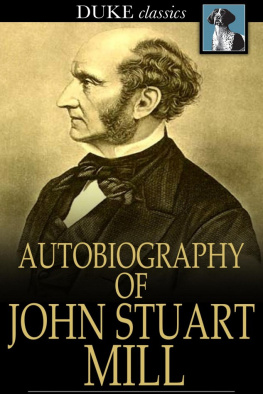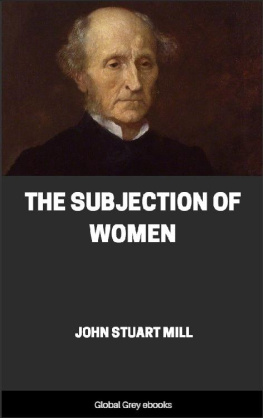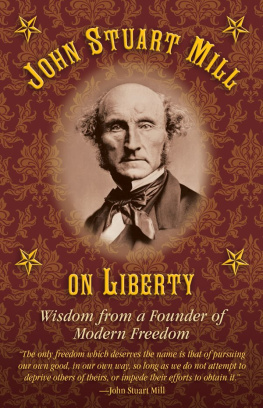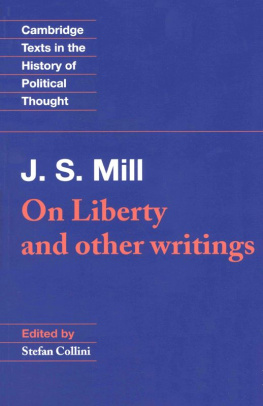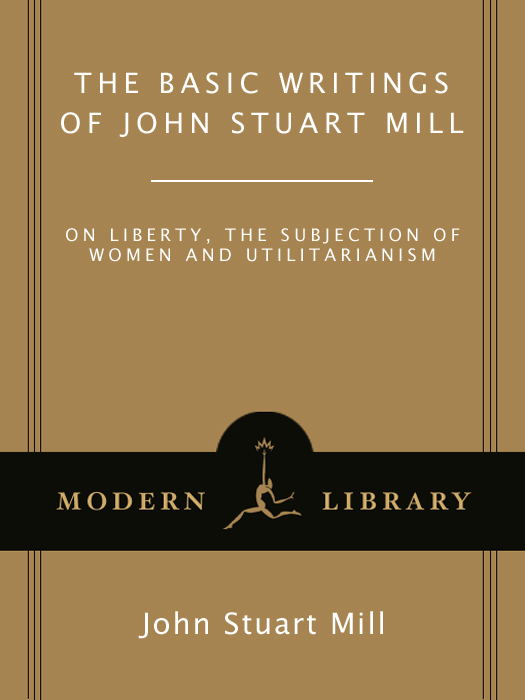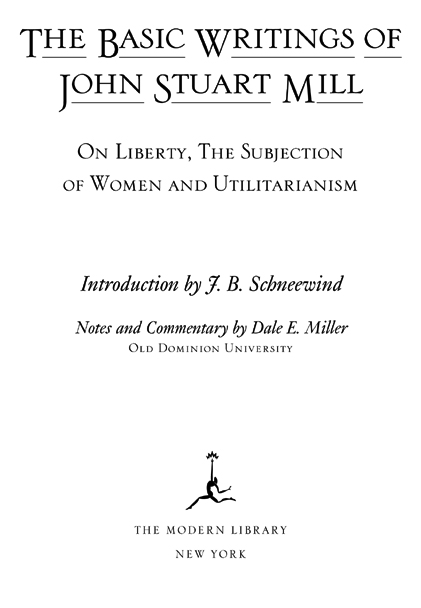2002 Modern Library Paperback Edition
Notes and commentary copyright 2002 by Random House, Inc.
Biographical note copyright 2002 by Random House, Inc.
Introduction copyright 2002 by J. B. Schneewind
All rights reserved under International and Pan-American Copyright Conventions. Published in the United States by Modern Library, an imprint of The Random House Publishing Group, a division of Random House, Inc., New York, and simultaneously in Canada by Random House of Canada Limited, Toronto.
M ODERN L IBRARY and the T ORCHBEARER Design are registered trademarks of Random House, Inc.
L IBRARY OF C ONGRESS C ATALOGING-IN -P UBLICATION D ATA
Mill, John Stuart, 18061873.
On liberty and other writings/John Stuart Mill; introduction by
J. B. Schneewind; notes and commentary by Dale E. Miller.
2002 Modern Library pbk. ed.
p. cm.
Contents: On libertyThe subjection of womenUtilitarianism.
eISBN: 978-0-307-76979-4
1. Liberty. 2. Utilitarianism. 3. Representative government and
representation. 4. Womens rights. I. Title.
JC585 .M6 2002
323.44dc21 2002066028
Modern Library website address:
www.modernlibrary.com
v3.1
J OHN S TUART M ILL
John Stuart Mill, the nineteenth-century British philosopher and political economist who placed ultimate value on the material and moral improvement of mankind, was born in London on May 20, 1806. His life and thought were decisively shaped from an early age by the forceful personality of his father, James Mill, a Scotsman who was himself a disciple of the utilitarian philosopher and reformer Jeremy Bentham. As Mill later recalled in his celebrated Autobiography (1873), he received a rigorous education that enabled him to use empirical and rational means to arrive at the truth. Tutored solely by his father, he began reading Greek at the age of three and soon studied Latin, mathematics, and logic; by the time he was fourteen Mill had acquired the equivalent of a university education. While still in his teens he contributed articles to Benthams Westminster Review and other radical journals. In 1823 he followed his father into the service of the East India Company, remaining with the firm until its dissolution in 1858.
At the age of twenty-one Mill experienced a period of disillusionment that caused him to question many aspects of the pragmatic Benthamite creed. Seeking to broaden his spectrum of knowledge so that he might recast utilitarianism in a more liberal and humane form, Mill investigated the works of Thomas Carlyle, Samuel Taylor Coleridge, and William Wordsworth. A deep friendship with Mrs. Harriet Taylor, a progressive feminist whom he eventually married, exerted another profound influence on his thinking. In 1836 Mill founded the London and Westminster Review, which soon emerged as a forum for enlightened radical views. Dissertations and Discussions (18591875), a compilation of articles culled from various journals, includes his famous essays on Bentham and Coleridge that date from this time. Mills career came to fruition during the 1840s with the publication of two monumental works. A System of Logic (1843), his spirited defense of inductive reasoning, culminates with a vision of the coming moral improvement of humanity. Principles of Political Economy (1848), a treatise on the interrelationship between capital, labor, and production, argues for a series of reforms aimed at the equitable redistribution of wealth.
On Liberty, Mills brilliant defense of individual freedom, was hailed as a classic upon its publication in 1859. A philosophic cornerstone of democratic morality, the work continues to exert a profound influence on Western thought. Reading it today, one cannot fail to be impressed by a tone of high conviction that is seldom found in the writing of our own times, stated critic Malcolm Cowley. One cannot fail to admire the consistency and coherence of its arguments, or to accept its guiding principle, That the only purpose for which power can be rightfully exercised over any member of a civilized community, against his will, is to prevent harm to others. Harvard law professor Alan Dershowitz added: John Stuart Mills enduring contribution to the theory of liberty is a remarkable tour de force. It is an accurate compass of liberty that points us in the proper direction as surely today as it did more than a century ago. Every citizen of the world who aspires to freedom should reread Mills On Liberty periodically and should consistently evaluate and challenge the actions of the state by reference to its simple but profound principle.
During the 1860s Mill went on to produce some of his most thought-provoking work. Considerations on Representative Government (1861), a deliberation on the merits and costs of democratic government, systematizes opinions Mill had advanced previously in numerous articles and reviews. Utilitarianism (1863), which was originally serialized in Frasers Magazine in 1861, presents his final reflections on the ethics of humanism. In 1865 he published Auguste Comte and Positivism, an assessment of the influential French social theorist, and An Examination of Sir William Hamiltons Philosophy, a full-scale critique of intuitionism. Mill is a great representative figure in Victorian intellectual history, stated the influential English critic F. R. Leavis. [His writings] are products of a disciplined mind and they have an intellectual distinction that is at the same time a distinction of character. For all the restrictive rigours of his fathers educational experiment [Mill] shows that he has a sensitive intelligence, informed by introspective subtlety, wide perceptions and a lively historical sense.
The Subjection of Women, Mills landmark feminist polemic, was greeted with both outrage and adulation when it appeared in 1869. A powerful indictment of the political, social, and economic position of women, the book endures as one of the cardinal documents of modern feminism. The Subjection of Women is a reasoned and eloquent statement of the actual position of women through history as well as an attack on the conditions of legal bondage, debilitating education, and the stifling ethic of wifely subjection within the Victorian period, reflected Kate Millett. It is argued as powerfully as the essay On Liberty and is as full of Mills splendidly controlled humanist outrage as any of his statements on slavery or serfdom, to which he draws frequent parallels. Susan Brownmiller observed: To come upon John Stuart Mill after one is already a feminist is a pleasurable discovery not unmixed with exasperation. It would have been helpful to have had the ammunition contained in The Subjection of Women when we fired the first rounds. But the essays powerful language, its remorseless lucidity, its heavy guns of logic, were locked in a forgotten armory. We can charge neglect, and possible conspiracy, but we must make certain that such books as Subjection will not be lost to us again.
After serving as a member of Parliament from 1865 to 1868, John Stuart Mill retired to France and died in Avignon on May 7, 1873. His Nature, the Utility of Religion, Theism, Being Three Essays on Religion appeared posthumously in 1874. So decisively has Mill entered the mainstream of modern thought that his voice can still be heard echoing from a hundred different places, remarked his biographer Eugene August. His insights are frequently as fresh as the morning newspaper. He preached womens liberation more than a century ago, defended racial equality with a vigor few modern liberals can match, and championed the environment long before ecological concerns began grabbing headlines. On world population, on big government and big business, on international nonintervention, he is astonishingly pertinent. Whether the subject is no-growth economics or humanist religion, Mill seems to have explored it long before our most advanced thinkers.


